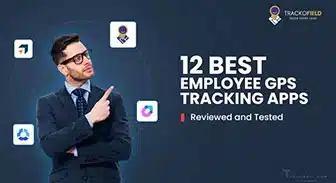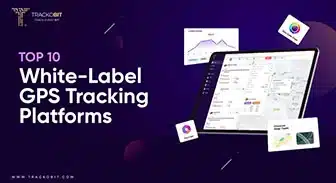-
TrackoBit
Manage commercial vehicles with the new-age Fleet Management Software
TrackoBit -
TrackoField
Streamline your scattered workforce with Field Force Management Software
TrackoField -
Features Resources
-
Blog
Carefully curated articles to update you on industrial trends. -
White Paper
Insightful papers and analysis on essential subject matters. -
Glossary
Explore an alphabetical list of relevant industry terms. -
What’s New
Get TrackoBit & TrackoField monthly updates here. -
Case Study
Explore the cases we solved with our diverse solutions. -
Comparisons
Compare platforms, features, and pricing to find your best fit.
-
About Us
Get to know TrackoBit: our team, ethos, values, and vision. -
Careers
Join the most dynamic cult of coders, creatives and changemakers. -
Tech Support
Learn about our technical support team and services in detail. -
Events
Check out the exhibitions where we left our marks and conquered. -
Contact Us
Connect with us and let us know how we can be of service.
GPS Tracking Vs Telematics: Understand the Real Difference
- Author:Anvesha Pandey
- Read Time:5 min
- Published:
- Last Update: December 23, 2025
Table of Contents
ToggleConfused between telematics and GPS tracking technology? Read on to learn how these two are similar and dissimilar in terms of functions, data collection, and more factors.
Table of Contents
Toggle
Ever wondered how delivery/ fleet management companies track their packages or how fleet managers optimize their routes? The answer to this often lies in technology, specifically GPS tracking and telematics. While both of these technological advancements involve monitoring location or valuable insights, they offer distinct functionalities and benefits.
This guide sheds light on the fundamental differences between both technological advancements.
How Does GPS Tracking Differ From Telematics?
Well if you are into logistics or fleet management, you might have heard these two technological terms i.e. GPS Tracking and Telematics. These two terms are very similar but can have different contexts when it comes to the collection of different types of data.
This guide will help you unfold the difference between these two technological terms in detail.
GPS Tracking: Your Virtual Copilot
Ever dreamt of having a loyal navigator whispering directions in your ear? Well if yes, that’s the essence of GPS tracking software. The system employs the Global Positioning System to pinpoint the location of vehicles or assets. You can simply say it is more like a digital map.
that is constantly updating your position.
| 📌GPS Tracking- GPS tracking refers to the process of utilizing the Global Positioning System (GPS) to determine the precise location of an object, person, or asset in real-time. It involves the use of GPS technology, which relies on a network of satellites orbiting the Earth to accurately pinpoint the location of a GPS receiver or a device.
GPS tracking systems typically involve a GPS receiver or device installed on the vehicle being tracked, that communicates with the satellites to determine its location. |
Telematics: Beyond Location, Deeper Insights
While GPS tracking tells you about the “whereabouts of your fleet”, telematics takes it a step further. Now, wonder if this virtual copilot will morph into a data analyst that provides insights i.e. beyond location. Telematics systems often combine GPS with sensors and onboard diagnostics to capture a wealth of information about vehicle performance, data on drivers’ performance, alerts on route deviation, and more.
| 📌Telematics– Telematics refers to the technology that combines telecommunications and informatics to send, receive, and store information related to the vehicle over a network. This then processes and analyzes that data for various purposes such as tracking, monitoring, and managing assets, optimizing vehicle performance, providing navigation assistance, and facilitating communication between vehicle and external systems.
Telematics systems often utilize GPS (Global Positioning System) technology to track the location of vehicles and other assets in real-time, along with various sensors to collect additional data such as speed, fuel consumption, engine diagnostics, and more. |
TrackoBit has leveled up telematics by providing video telematics. Keep an eye on your fleet easily with us!
Core Differences between GPS Tracking and Telematics
Now that you know the definition of GPS tracking and telematics, let’s have a look into some other bases of differentiation between the two.
| Basis | GPS Tracking | Telematics |
| Primary Functions |
|
|
| Data Collection |
|
|
| Applications |
|
|
| Integration |
For instance- a GPS tracking system can be integrated with fleet management software to provide a complete fleet tracking and management solution. |
|
Why TrackoBit’s Telematics Solution Is The Right Fit For You?
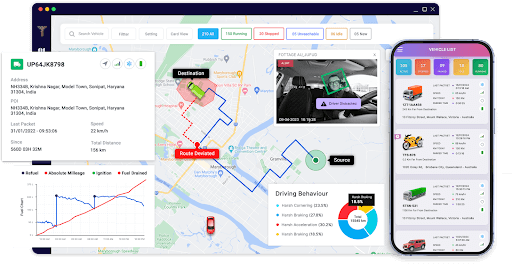
With TrackoBit, you can track every bit of your fleet, as it provides precise GPS tracking capabilities wrapped in comprehensive vehicle telematics solutions, allowing fleet managers to accurately monitor the location of their vehicles or assets in real time. Our video telematics solutions give you access to:
- Efficient GPS tracking of vehicles, live on the map – to ensure enhanced visibility & safety.
- Efficient and fastest delivery routes, to save your traveling miles.
- Reports on speed, vehicle diagnostics, engine idling, and distance traveled.
- Alerts on route deviation, geofence entry/exit, and more than 50+ custom alerts.
- Fuel consumption and utilization reports.
- Driver’s driving events and in-cabin activities.
What more? TrackoBit offers customization depending on their specific needs. It offers customization options to tailor the solutions to your requirements.
Still, thinking? Just get in touch with us to improve your fleet management with our GPS-powered telematics software.
FAQs
-
How is GPS Tracking different from Telematics?
GPS tracking focuses primarily on location tracking, providing information about the location of a vehicle or property. Telematics, on the other hand, encompasses vast amounts of data collection and analysis including vehicle analysis, fuel consumption, driver behavior, and more.
-
What data does telematics provide?
Telematics solutions provide more information than just location, including vehicle analytics, driver behavior, and more.
-
Can GPS tracking and telematics be integrated into existing systems?
Yes, both GPS tracking and telematics systems can often be integrated into existing fleet management or operational systems. This integration allows for seamless data sharing and analysis, providing a more comprehensive view of vehicle and asset performance.
-
Do GPS Tracking and Telematics incorporate different technologies?
While GPS tracking and telematics both of these technologies rely on GPS technology for locational data. But then telematics includes additional sensors, communication devices, and software to collect, and transmit detailed insights that are beyond the locational data.
-
How are GPS tracking and telematics used in different industries?
GPS tracking is commonly used in industries where real-time location monitoring is critical, such as transportation and logistics, delivery companies, construction, and emergency services. Telematics, with its broader data collection capabilities, is utilized in these industries as well but is also prevalent in fleet management, insurance, automotive, and even personal vehicle monitoring.
Anvesha is a communication specialist at TrackoBit. With a strong background in media and communications, she adds much-needed balance and brevity to TrackoBit’s... Read More
Related Blogs
-
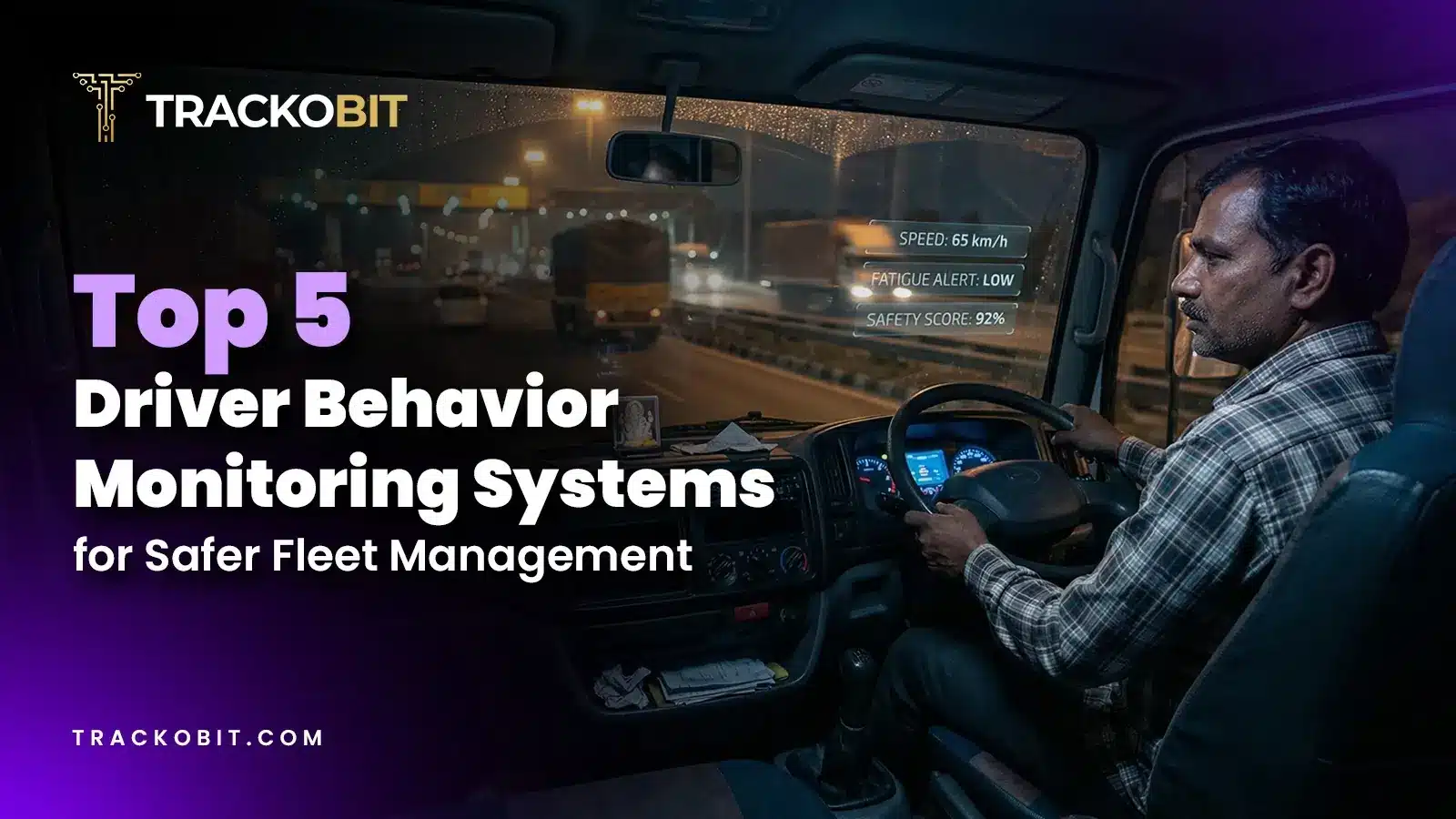
5 Best Driver Behavior Monitoring Systems for 2026
Tithi Agarwal February 23, 2026Having the best driver behavior monitoring system is a necessity as it helps you ensure driver safety and optimize operational…
-
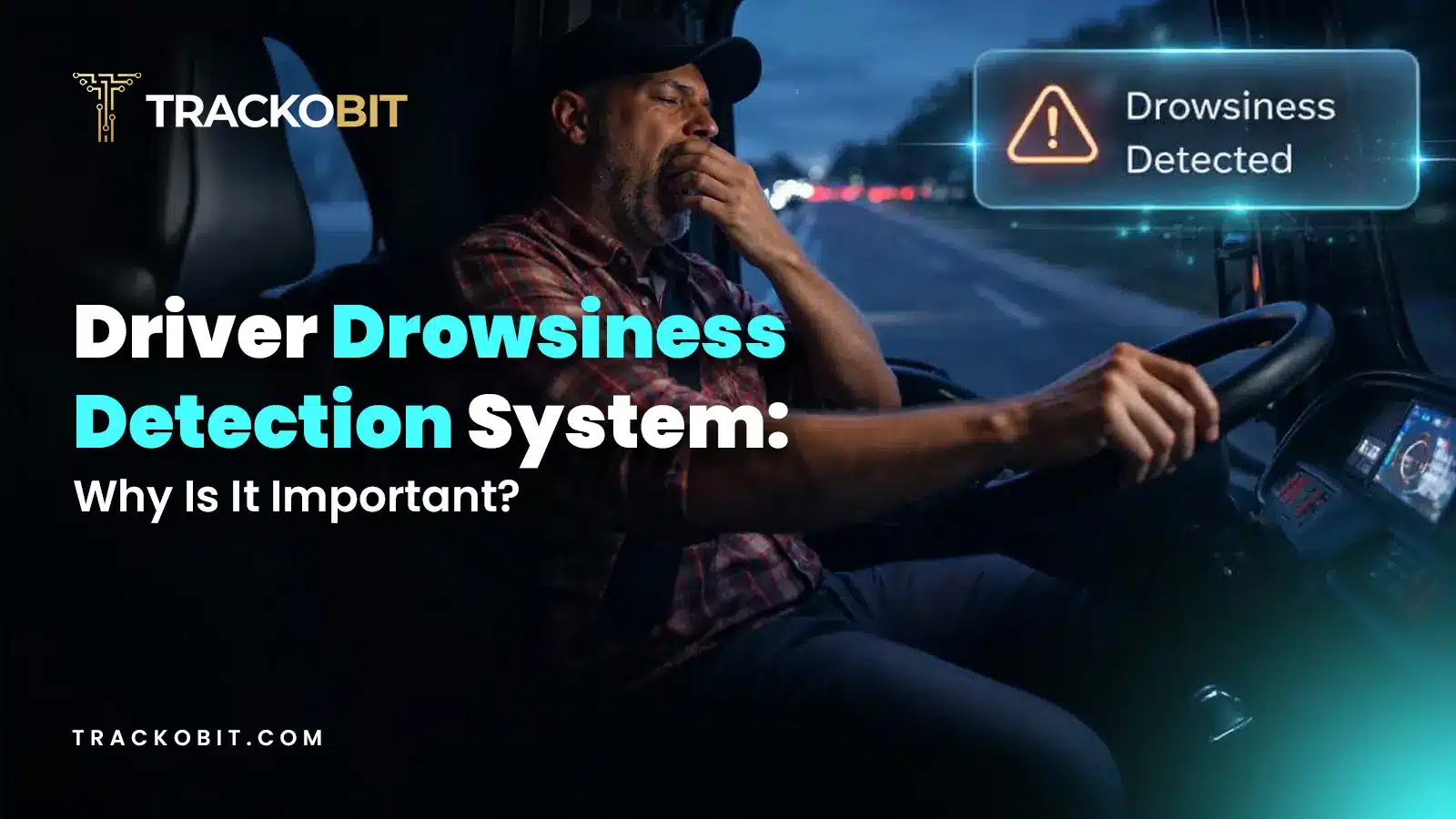
Why is Driver Drowsiness Detection System Important for Fleet Management?
Shemanti Ghosh February 4, 2026A driver drowsiness detection system is critical for fleet management. It helps prevent fatigue-related accidents and reduces operational risks through…
-
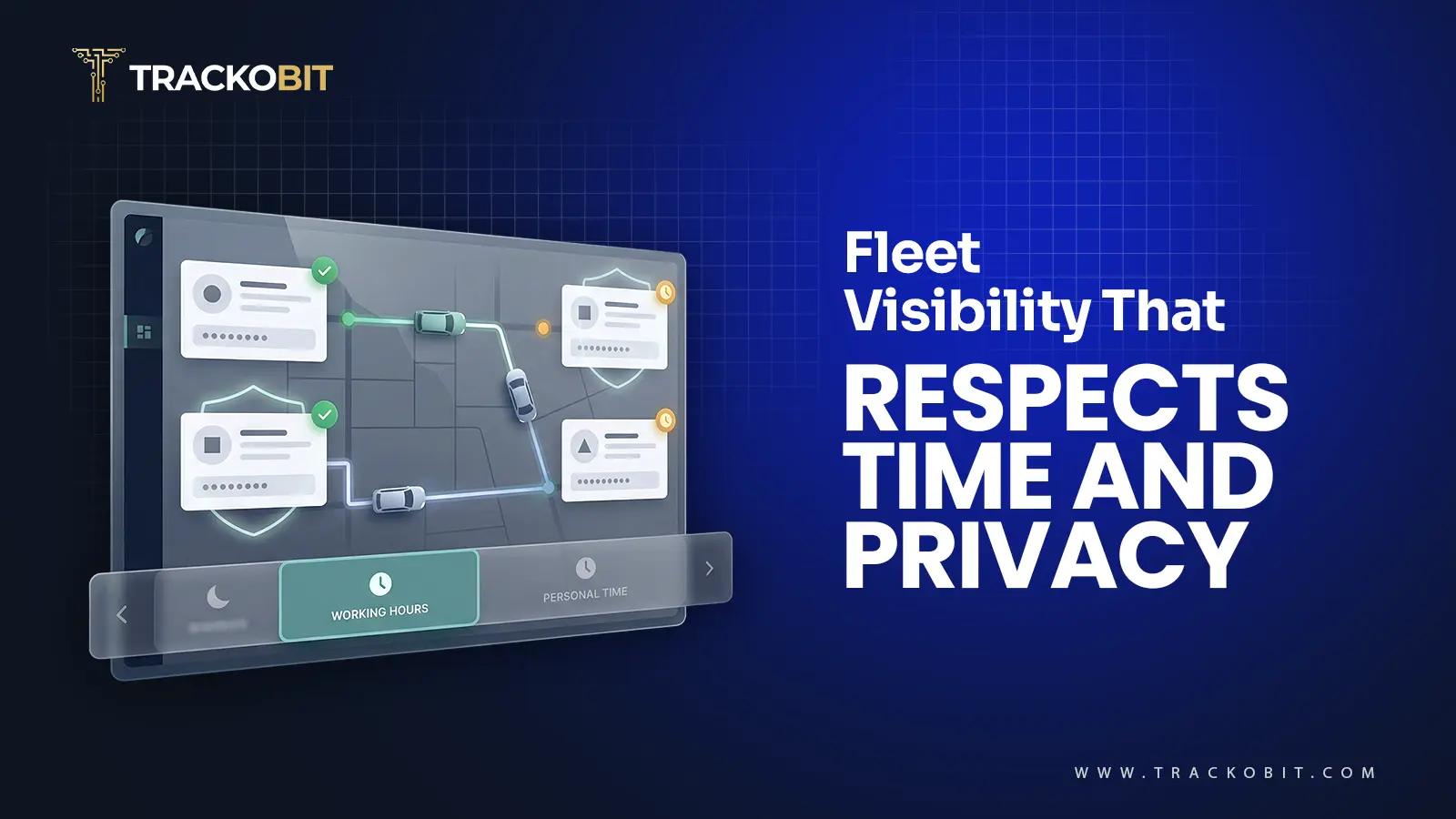
When Tracking Needs a Clock: Rethinking Fleet Visibility
Tithi Agarwal December 24, 2025Read on to understand why fleet tracking works better when it follows working hours. Because visibility should support operations, not…
-
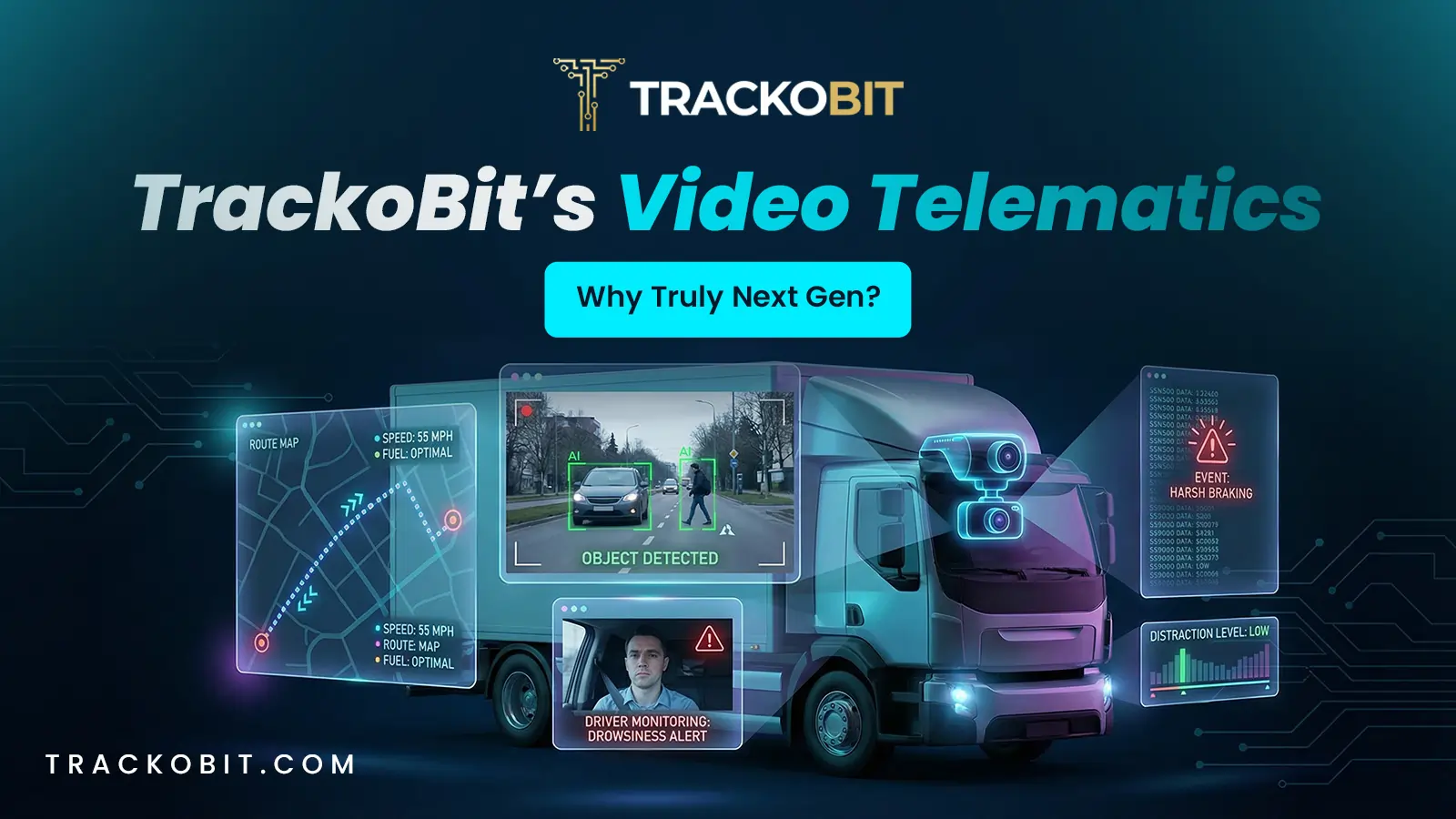
What Makes TrackoBit’s Video Telematics Software Truly Next-Gen?
Shemanti Ghosh December 17, 2025TrackoBit’s video telematics software blends smart video intelligence with full server control. The result? Superior fleet reliability and safety.

Subscribe for weekly tips to optimize your fleet’s potential!
Your inbox awaits a welcome email. Stay tuned for the latest blog updates & expert insights.
"While you're here, dive into some more reads or grab quick bites from our social platforms!"Stay Updated on tech, telematics and mobility. Don't miss out on the latest in the industry.
We use cookies to enhance and personalize your browsing experience. By continuing to use our website, you agree to our Privacy Policy.


































